
Background
DiCED is motivated by 2 key trends:
- Democratic Deconsolidation: “when…a sizable minority of citizens loses its belief in democratic values, becomes attracted to authoritarian alternatives, and starts voting for “antisystem” parties, candidates, or movements that flout or oppose constitutive elements of liberal democracy. Democracy may then be said to be deconsolidating.” (Foa and Mounk, 2016). 2 main components: decline in view that democracy is the best form of government and rise in support for non-democratic /authoritarian governing options
- Rise of New ‘Anti-Democratic’ Campaign Methods: “Political parties or candidates often use social media as part of a broader campaign strategy. Here we are interested in political parties or candidates that use social media to manipulate public opinion during a campaign, either by purposefully spreading fake news or disinformation, or by trolling or targeting any support for the opposition party. This is different to traditional digital campaign strategies, which have generally focused on spreading information about the party or candidate’s platform, or sent advertisements out to voters. (Bradshaw and Howard, 2017)


